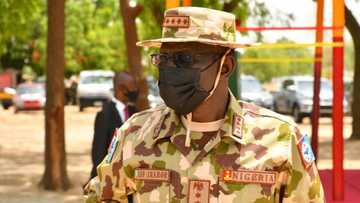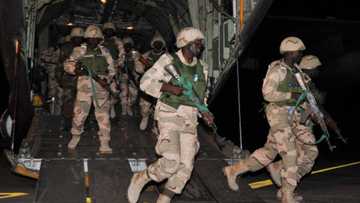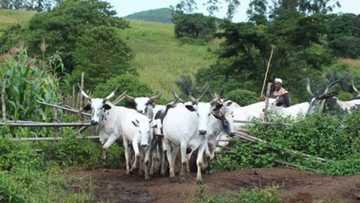Insurgency: There's Need to Immunize People From Manipulations of Extremists, Says UN
- In a bid to end the activities of insurgents in the Lake Chad region, the UN has called for the shielding of communities members from violent ideologies
- This was suggested at the launch of the Lake Chad Basin Chapter of the Civil Society Organisation Network for Inclusive Rehabilitation and Reintegration in Abuja
- The network also advocated improved collaboration between governments and CSOs in ending violent extremism in the Lake Chad region
PAY ATTENTION: Join Legit.ng Telegram channel! Never miss important updates!
Abuja, FCT - The United Nations has said that there is a need to shield people especially the young population from manipulations of violent extremists across the Lake Chad region.
The director of the United Nations Educational, Scientific and Cultural Organisation (UNESCO) at the regional office for Central Africa, Salah Khaled, said the problem of insurgency across the Lake Chad region has continued to persist despite efforts made by the UN and various agencies.
Khaled said this at the launch of the Civil Society Organisation (CSO) Network for Inclusive Rehabilitation and Reintegration, Lake Chad Basin Chapter which was co-hosted by Neem Foundation and the Elman Peace Centre and attended by Legit.ng.
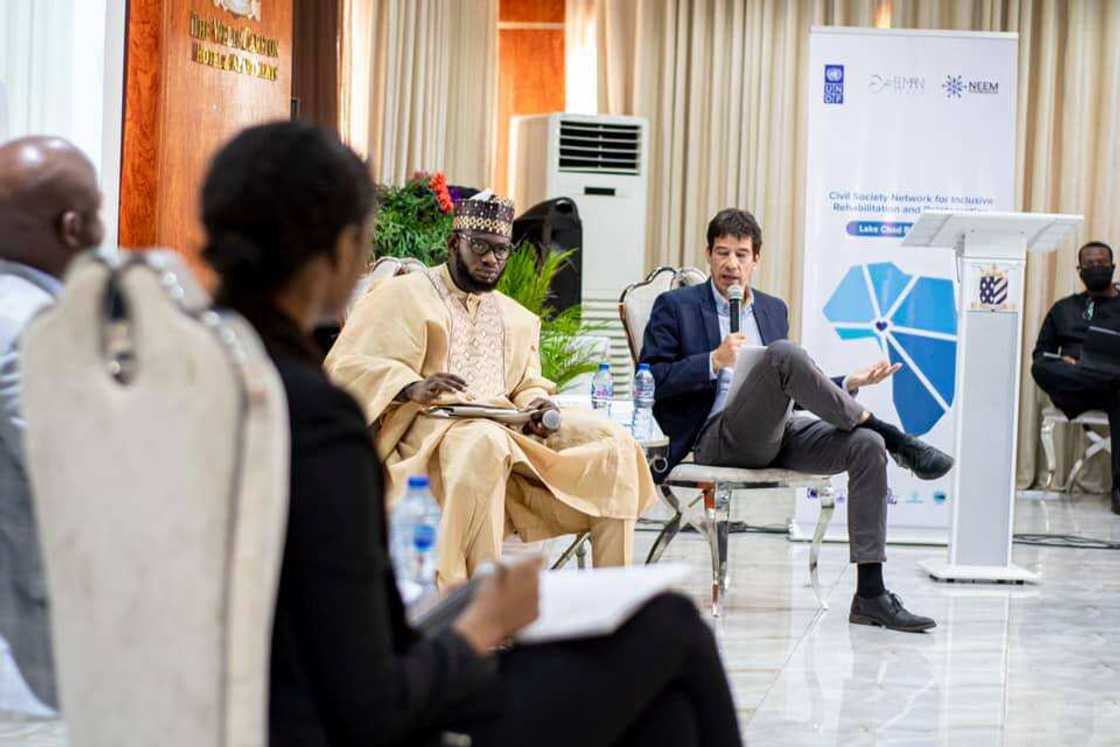
Source: Facebook
PAY ATTENTION: Install our latest app for Android, read the best news on Nigeria’s #1 news app
The network is a leading African peacebuilding organisation created with the aim of building into and onto the regional strategy for the stabilisation, recovery and resilience of the Boko Haram affected areas of the Lake Chad Basin region.
The Process of Rehabilitation, Reconciliation and Reintegration
The LCB CSO network specifically uses community-driven approaches for rehabilitation and reintegration functions with support from the United Nations Development Programme (UNDP).
However, Khaled said the UNESCO regrets that the consequences of some of the violent extremism largely perpetrated by the Boko Haram terrorist, are alarming with nearly over two and a half million people displaced.
He also noted that ecosystems have continually been degraded and the livelihood of the members of the communities affected by the insurgents' activities.
He said with the Lake Chad Basin region being the front line in the fight against climate change insecurity and poverty, strengthening the partnership between government agencies and CSOs is key in addressing the problems.
Khaled said:
"Through our joint efforts, we have the potential to be a laboratory of ideas and chain of hope to address these problems.
"The UN 2030 agenda is a call for collaborative efforts to eradicate poverty, combat climate change and promote peace."
Further pointing out that the reintegration of ex-Boko Haram combatants is crucial to move from the classic standard and basic training sessions to bring technical vocational training, Khaled said the people in the region must be provided with a new alternative to immunise them from the manipulations of the violent extremists.
For the executive director of Neem Foundation, Fatima Akilu, and the chief operating officer of the Elman Peace Centre, Ilwad Elman, the essence of the event is to bring together over 30 participants selected on the basis of knowledge and experience in supporting reintegration through their work in governments, international organisations among others.
Also speaking, Mohamed Yahya, the UNDP Resident Representative in Nigeria, said the activities of the terrorist group is still prominent in the region despite liberation through military and various efforts.
Yahya said a lot more needs to be done, including addressing the direct relationship between marginalisation, poverty and the reason people join violent extremism.
Yahya said:
"Boko Haram doesn't control as many territories as they used to, things have improved, but we are not where we want to be.
"In my conversations with the military, they can only do so much in terms of fighting violent extremism, and the solution to violent extremism is some of the work that CSOs and governments have to do."
"We need to do reintegration differently. We have to think theoretically to finding solutions and its the hands of CSO."
Government's efforts
In her address, the special adviser to President Muhammadu Buhari on social investments and protection, Maryam Uwais, said the president acknowledges the role civil society organisations play in building resilience and social responses to the insecurity situations in Nigeria and the Lake Chad region.
Uwais said providing alternatives to perpetrators and potential perpetrators of violence in the Lake Chad Basin is key to strengthening protection systems.
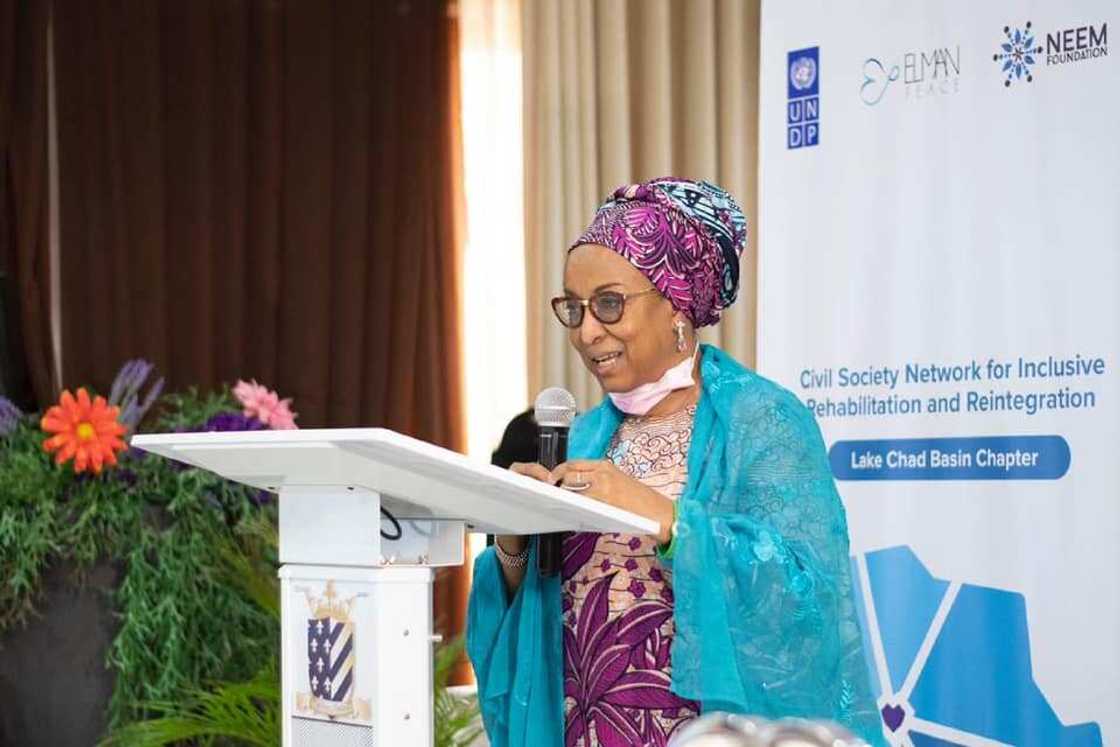
Source: Facebook
She said:
"It is very important that we have a grassroots governance mechanism through the CSOs to improve on rehabilitation, reconciliation and reintegration process."
"To address the challenges, the CSOs are best placed; they understand all these and are able to detect early warning signs even before conflicts escalates. We need to begin to also leverage local expertise in surmounting these challenges."
Uwais further said that she looks forward to supporting the LCB CSOs network through the office of the presidency.
In a Facebook post, Neem Foundation had described early warning signs as a tool used by the Foundation to alert communities of the potential outbreak, escalation and resurgence of violent conflict.
Also, Legit.ng previously reported that 73 members of the Boko Haram terrorist group were killed by troops of the Nigerian military in Borno state.
The troops under the operation Hadin Kai also reduced 55 victims held captive by the terrorists in the state.
According to the acting director of Defence media operations, Brigadier General Benard Onyeuko, some military hardware including gun trucks, anti-aircraft guns, communications and weapon cleaning materials were recovered from the terrorists.
In other news, a member of the Islamic State in West Africa Province (ISWAP) has been arrested by troops of the Nigerian army.
The ISWAP member, identified as Ibrahim Musa, was said to have been arrested while on a mission to Lagos where he went to acquire times from his group's operation.
The acting director of the defence media operation said Musa was arrested at No 31 Abartura street in Sango-Ota, Ogun state.
Source: Legit.ng



